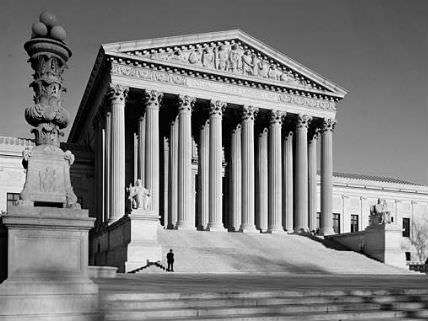The Lame Liberal Attack on the 'Secretive' Federalist Society
There's nothing secretive about this well-known conservative legal organization.

In anticipation of this week's Supreme Court oral arguments in the Obamacare case King v. Burwell, ProPublica ran a story on the "secretive" and "behind the scenes" organization whose "hidden hand" is shaping "the intellectual heart of the King v. Burwell legal challenge." What is the identity of this shadowy outfit? What secret cabal has ProPublica unveiled to the world?
It is none other than the Federalist Society, one of the most well-known legal organizations at work in America today. Perhaps my dictionary is out of date, but I don't think the word secretive means what ProPublica thinks it means.
But sure, let's play along. How "secretive" is the "hidden hand" of this "behind the scenes" group of conservative, libertarian, and moderate lawyers and law students?
In 2000 the Washington Monthly profiled the "secretive" Federalist Society and dubbed it "quite simply the best-organized, best-funded, and most effective legal network operating in this country." One year later, the liberal activist group People for the American Way released a widely quoted report on the "secretive" Federalist Society titled "The Federalist Society: From Obscurity to Power." In 2005 Supreme Court nominee John Roberts' possible membership in the "secretive" Federalist Society was big news in The Washington Post. In 2008 the political scientist Steven Teles published a superb book called The Rise of the Conservative Legal Movement, which devoted a full chapter to the "secretive" Federalist Society's origins, structure, membership, and influence. Former Vice President Al Gore blurbed Teles' book as "an essential road map to the organization mobilization of conservatives over the past century." In 2013 a pair of liberal activists published their own book on this "secretive" group titled The Federalist Society: How Conservatives Took the Law Back from Liberals. That book turned out to be mostly underwhelming, but it did manage to get reviewed in the well-thumbed pages of The New York Times. And finally, my own recent book, Overruled: The Long War for Control of the U.S. Supreme Court, also examines the Federalist Society's origins and influence. As part of the research for my book, I interviewed Eugene Meyer, the head of this "secretive" organization. He was happy to talk on record. (I should also add that I've recently had the opportunity to speak at several Federalist Society events. Those events were free and open to the public.)
If the Federalist Society is indeed a "secretive" outfit, it may be the worst kept secret in all of American politics.


Show Comments (49)